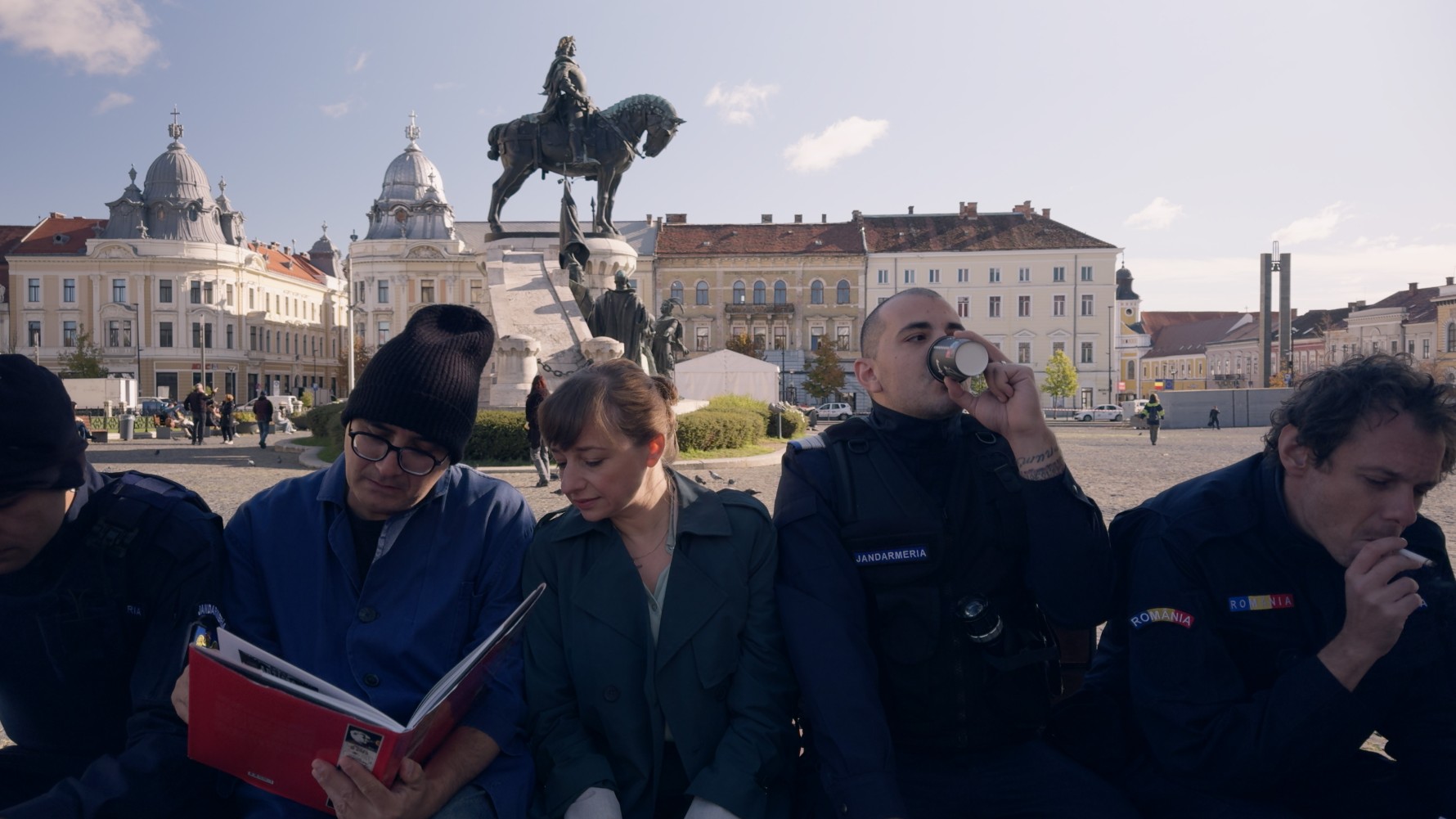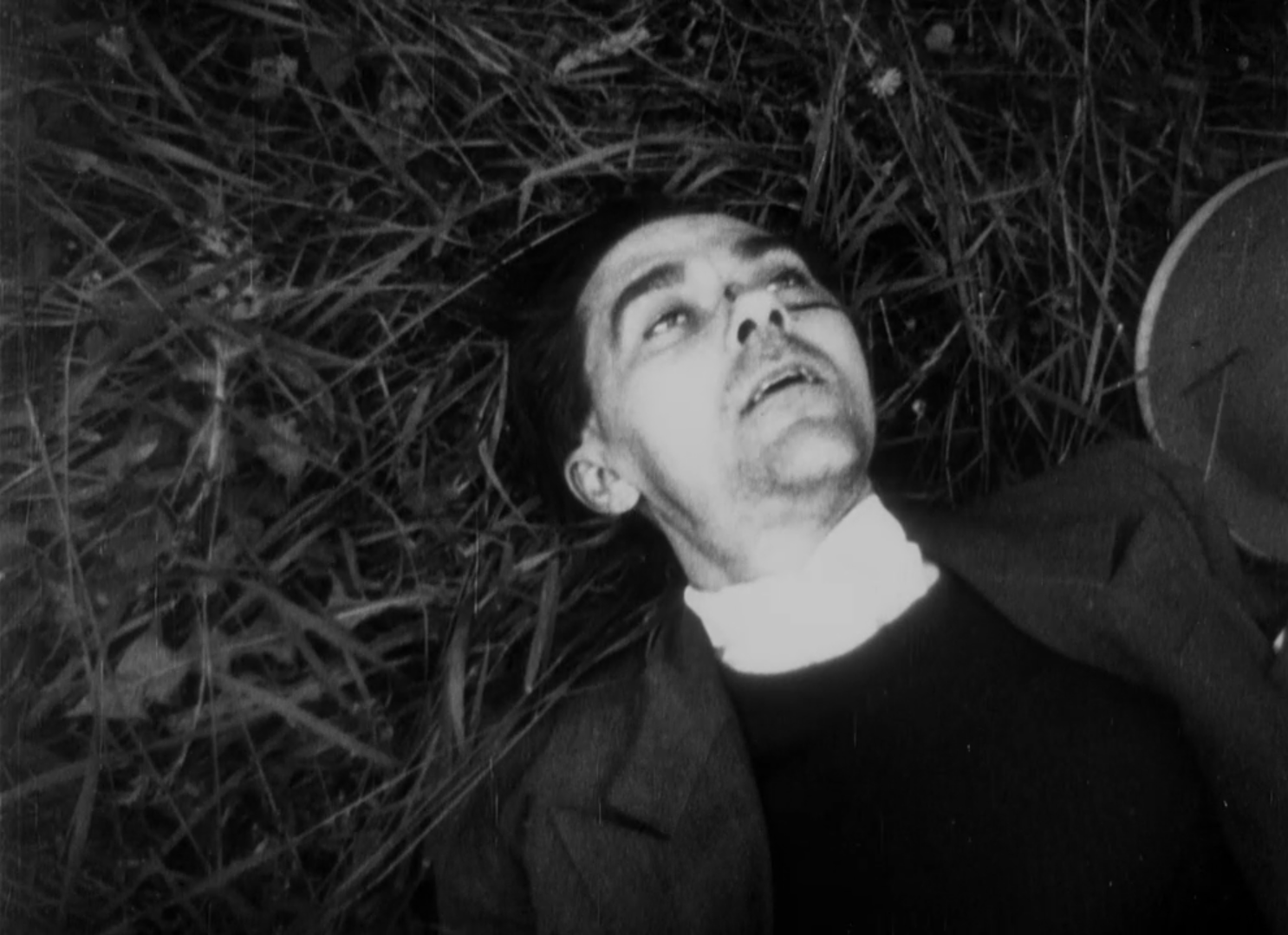Kontinental ’25 by Radu Jude | Kind reminder: It’s Time to Die
Nothing could be more natural for Radu Jude’s filmography than a comedy about death – and yet, no one would have expected Kontinental ’25, a meteor of a film appearing out of nowhere and heading nowhere, to be his most anxiety-inducing work.
From the very beginning, Jude’s cinema has given off the feeling of “the trouble with being born.” Whether it’s The Tube with a Hat (2006) or Do Not Expect Too Much from the End of the World (2023), everyday life – within the family, at work, among friends – unfolds as an endless sequence of responsibilities (mundane, moral, intellectual) that are not just alienating and unsatisfying but downright embarrassing, drearily exhausting, and, where Jude’s burlesque touch comes in, exasperating. Naturally, such a life is haunted by death.
Nothing could be more natural for Radu Jude’s filmography than a comedy about death – and yet, no one would have expected Kontinental ’25, a meteor of a film appearing out of nowhere and heading nowhere, to be his most anxiety-inducing work.
For instance, in A Film for Friends (2011; a farewell video-message from a suicidal man who fails to take his own life), the protagonist played by Gabriel Spahiu sees death as his only chance at dignity. But nothing is ever simple in Jude’s cinema – in the same film, death proves to be just as frustrating and humiliating as life. Later, Shadow of a Cloud (2013), It Can Pass Through the Wall (2014), and Sleep #2 (2024) explored life after death – finally free of responsibilities, yet a burden for those left behind. Though his work often sounds cynical, Jude is not a cynic – his cinema is frustrated, caught in an unresolved moral dilemma, i.e. the impossibility of altruism in contemporary society. And Kontinental ’25 is a full-fledged tragicomedy of repressed humanism – more meditative and melancholic than his recent Bad Luck Banging or Loony Porn (2021) or Do Not Expect Too Much… (which makes it more anxiety-ridden, less cathartic) and more faithful to Warholian bad filmmaking principles (single takes, open-ended scripts, improvisation, etc.). It’s truly a pocket-sized film, agile and necessary, sometimes endearingly trashy, sometimes just plain frustrating, the product of a remarkable endeavour, shot on a phone, without a budget, in parallel with Jude’s upcoming Dracula.
Though his work often sounds cynical, Jude is not a cynic – his cinema is frustrated, caught in an unresolved moral dilemma. And Kontinental ’25 is a full-fledged tragicomedy of repressed humanism – more meditative and melancholic than his recent Bad Luck Banging or Loony Porn (2021) or Do Not Expect Too Much… (which makes it more anxiety-ridden, less cathartic) and more faithful to Warholian bad filmmaking principles.
As Jude has already mentioned in his interviews for international publications, the film is a caricature of Europe ’51, Roberto Rossellini’s postwar masterpiece starring Ingrid Bergman as a contemporary saint who, unable to console herself after her young son’s presumed suicide and dismissive of the idea that society at large is to blame, dedicates herself entirely to helping the poor – only to end up a suspect in the eyes of that same society and ultimately confined to an asylum.
Well, Kontinental ’25 follows the ever-excellent Gabriel Spahiu, already the embodiment of the everyday Romanian in contemporary cinema, navigating not Bucharest this time, but Cluj – Romania’s other city. As far as I know, this is Jude’s first fiction film set outside his native Bucharest. And while Cluj lacks the semiotic-decadent spectacle of the capital, it serves the film well for three key ideas: first, the class tension between Spahiu’s character and the gentrified, picture-perfect old town; second, the ethnic tension, subtly accentuated by the narrative – a single shot of the Mihai Viteazul statue is enough to ratchet up the tension; and third, the high-rise residential blocks in Florești (as in many parts of Romania), standing as monuments to the status quo – perhaps not always illegal, but certainly built on the immoral foundation of greed.
Nowadays, death threats begin with a kind reminder.

Spahiu plays Ion Glanetaș (named after the protagonist of Liviu Rebreanu’s novel Ion, about the struggle for land in rural Romania), a poor man collecting plastic bottles off the streets, moving through often hilariously surreal settings (dinosaur parks, smart bus stops, etc.), muttering curses like prayers – an uncompromising, no-nonsense embodiment of poverty. The next morning, he is awakened by bailiff Orsolya (Eszter Tompa) and a team of gendarmes, there to evict him. The building whose basement he lives in, a small house in the city centre, is set to be demolished to make way for the boutique hotel Kontinental. Though he is scolded and infantilized, he is spoken to politely, in a tone of courteous violence – the same tone that dominates the earlier images of the gentrified city centre. Nowadays, death threats begin with a kind reminder. Given a brief moment to gather his things, Ion Glanetaș hangs himself from the radiator – another bizarre, darkly comic depiction of death, with a B-movie aesthetic: a top-down shot of Spahiu’s lifeless body eerily recalls the footage of Ion Antonescu’s execution filmed by Ovidiu Gologan in 1946, which Jude explored in a film in 2018. And so, Orsolya spirals into an existential crisis.

But Kontinental ’25 is no hagiography (Jude’s protagonists are always morally approachable – that is, unlikable, no matter how charismatic). Rather, it is the story of a conformist who suddenly considers something dangerous – the possibility that she might bear some responsibility for the injustice and suffering in the world. A thought quickly countered by family (she needs the job to provide for her children), a priest (there is no excuse for suicide), moral relativism, whataboutism, calls for more NGO charity, etc. As always, Jude isn’t preaching – this is simply the story of a woman who couldn’t change the world and, at times, isn’t even sure if she wants to. Sound familiar?
“Kontinental ’25” had its world premiere in the Official Competition of the 75th Berlin International Film Festival, in 2025.
Title
Kontinental '25
Director/ Screenwriter
Radu Jude
Actors
Eszter Tompa, Gabriel Spahiu, Adonis Tanța, Oana Mardare, Șerban Pavlu
Country
Romania
Year
2025
Film curator, writer and editor, member of the selection committees of BIEFF and Woche der Kritik, FIPRESCI member and alumnus of the film criticism workshops organized by the Sarajevo, Warsaw and Locarno film festivals. Teaches a course on film criticism and analysis at UNATC. He has curated programs for Cinemateca Română, Short Waves, V-F-X Ljubljana, Trieste Film Festival, as well as the Bucharest retrospective of Il Cinema Ritrovato on Tour in 2024 and 2025.


